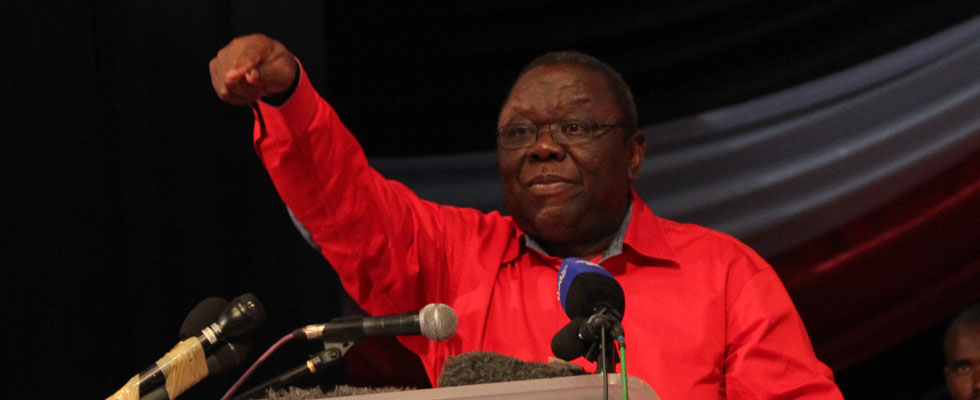
THE MDC-T yesterday claimed the Zimbabwe Electoral Commission (Zec) had lost control of the elections to State security agents as it emerged uniformed forces were, at some centres, still casting their ballots as special voters by early yesterday, several hours after the cut-off time, in violation of electoral laws. REPORT BY STAFF REPORTERS
Addressing a Press conference in Harare, MDC-T secretary-general Tendai Biti said his party would make a High Court application to contest the outcome and approach Sadc citing a litany of electoral violations.
Biti absolved Zec chairperson Justice Rita Makarau and some of the commissioners of wrongdoing, but castigated some members of the secretariat whom he said were disregarding directives handed down to them.
“There is a total disconnect between Zec and their officers on the ground. Unknown elements have literally taken over the show. They (Zec officials) are now taking instructions direct from the junta,” he said.
However, Biti did not produce evidence of how the alleged junta had taken over.
Biti’s comments were echoed by MDC-T leader Prime Minister Morgan Tsvangirai, who told party supporters at a campaign rally at Mutora business centre in Gokwe that Zec had deliberately bungled the special voting to rig the polls.
“They failed to handle 80 000 voters in two days — how can they be expected to handle six million voters in one day, on July 31?” Tsvangirai queried.
He said failure by Zec was not by coincidence, but was planned.
- Chamisa under fire over US$120K donation
- Mavhunga puts DeMbare into Chibuku quarterfinals
- Pension funds bet on Cabora Bassa oilfields
- Councils defy govt fire tender directive
Keep Reading
He said artificial shortages of special voting ballots had been created after Zanu PF had realised that the police whom they had thought would vote for them were actually going to vote for the MDC-T.
“They want to steal the elections through the special ballot vote. They had all the 80 000 ballots, but what their intelligence told them was that the police also wanted change. They then created an artificial shortage and only released 5 000 special envelopes,” he said.
Tsvangirai also accused Zanu PF of bussing its youths to vote as police officers at the Mount Pleasant Hall polling station.
In Harare, Biti challenged Zec to explain what legal instruments they had used to extend the special voting period beyond its scheduled cut-off time.
“The continuation of special voting is a clear breach of the law, which we are going to challenge in court. According to Section 81 part 14 of the Electoral Law, the process should have ended by 7pm on Monday, but uniformed forces are still voting as we speak,” he said, adding that they would file their application before the end of the day yesterday.
At Town House in Harare, members of the uniformed forces were still milling around at around mid-morning yesterday and only dispersed at 12:20pm after they were told to go back to their stations. One police officer told NewsDay: “Yes, we were still voting by 5am (yesterday). We are under clear instructions that we have to vote before returning to work,” she said.
Biti cited cases in which Zec officials were allegedly reduced to bystanders.
“In Midlands, an officer-in-charge of one police station ended up as the presiding officer . . . In Mabvuku, the voters’ roll was completely disregarded as uniformed forces were only asked to produce their force numbers . . . In Manicaland, MDC-T polling agents were chased away,” he said, adding that Zanu PF was now panicking after realising that their ploy to intimidate uniformed forces members by forcing them to vote in their bosses’ presence had hit a brick wall.
Meanwhile, Zec yesterday admitted the process had turned chaotic, adding the commission had decided to get those that had failed to cast their ballots to vote together with the rest of the electorate on July 31.
“. . . a substantial number of members of the disciplined forces and electoral officers of the Zimbabwe Electoral Commission were unable to cast votes because their ballot papers did not reach their special voting centres before the close of special polling or at all,” the statement read.
“The Zimbabwe Election Commission will, therefore, ensure that all persons who were deprived of the opportunity to vote between 14 and 15 July 2013 will be able to vote on 31 July 2013 when the rest of the electorate votes.
“To this end, only the names of those who actually cast ballots during the special vote will be deleted from the ward voters’ rolls that will be used for polling on 31 July 2013.
“Lists of those officers who voted on 14 and 15 July 2013 and those who failed to cast their ballots will lie open for public inspection at the offices of the Chief Elections Officer.
“The Zimbabwe Electoral Commission sincerely regrets the inconvenience caused to members of the disciplined forces and of the Commission itself, to political parties and to the nation at large.”
National police spokesperson Senior Assistant Commissioner Charity Charamba said the police were yet to establish how many of their members had voted.
“We will issue a statement soon as we are still consolidating information from throughout the country,” she said.
On Monday, police sought to blame the MDC-T for the chaos that characterised the special voting process.







